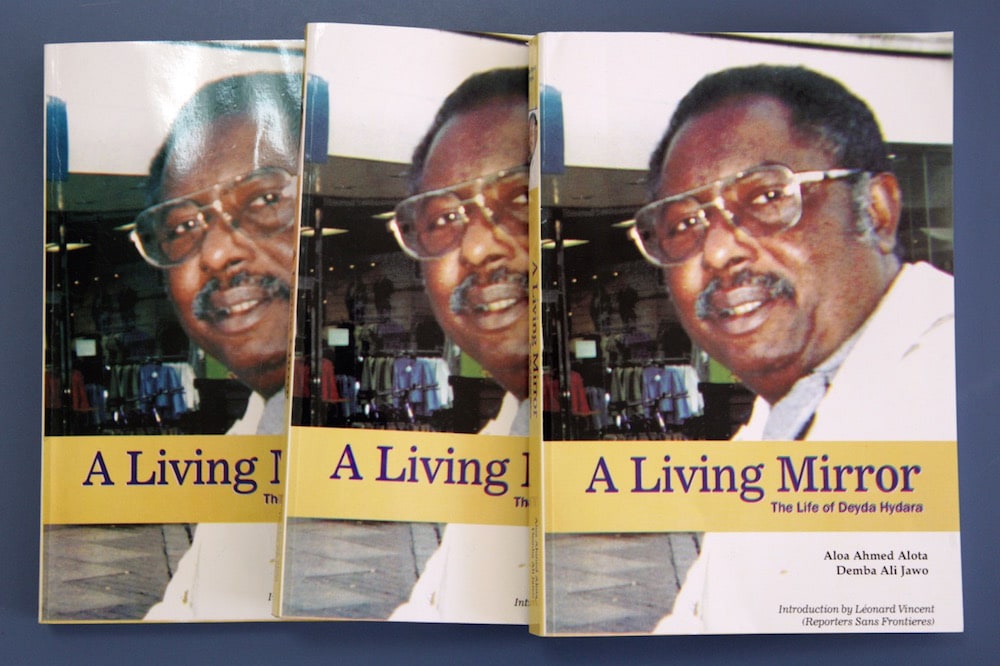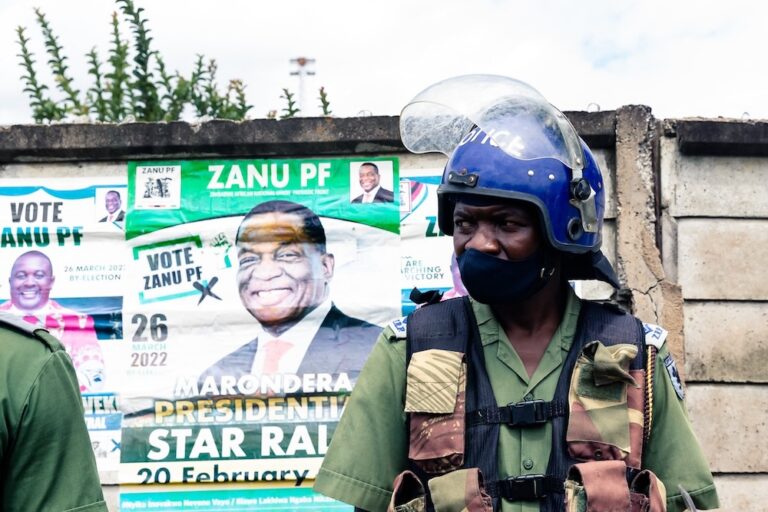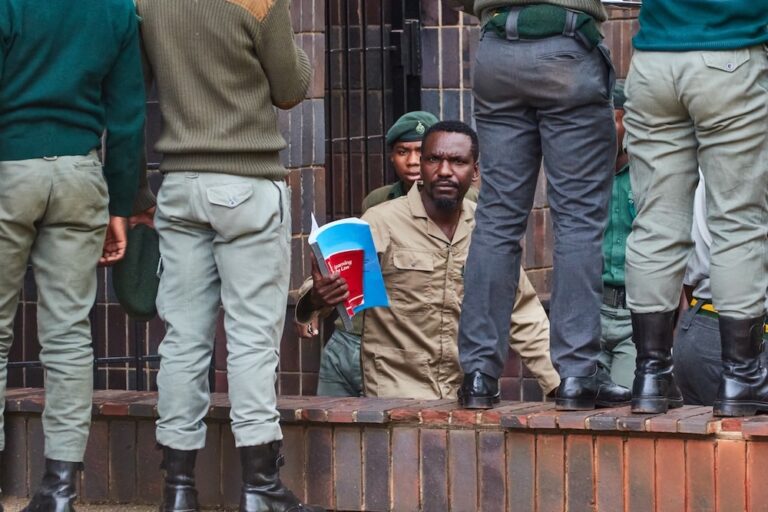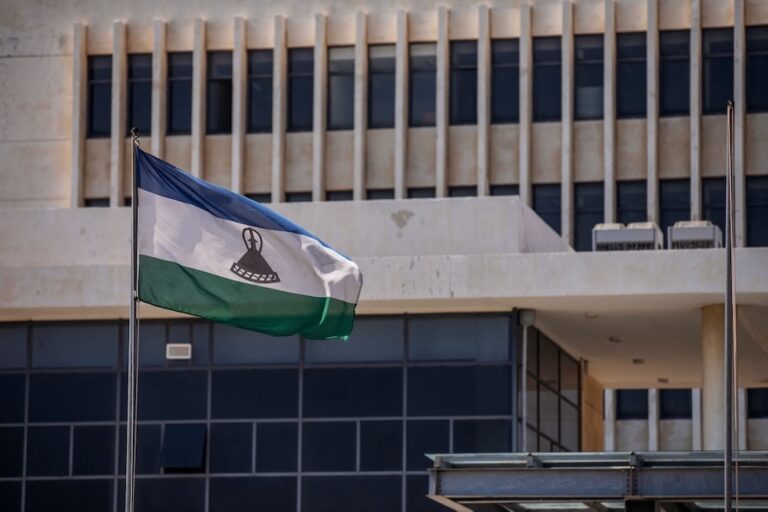December 2020 in Africa: A free expression roundup produced by IFEX's regional editor Reyhana Masters, based on IFEX member reports and news from the region. An audio discussion relating to this piece is available here.
The end of 2020 brought an unexpected but welcome Christmas Eve gift in the unconditional release, through a presidential pardon, of Burundian journalists Agnes Ndirubusa, Christine Kamikazi, Egide Harerimana and Terence Mpozenzi.
The journalists from Iwacu Press Group, one of the country’s remaining independent media outlets, were sentenced to two and half years in prison and fined a million Burundian francs (US$515) in what was seen as a flawed legal process.
The #IWACU4, as they came to be known, were charged with threatening state security after being arrested in October 2019, despite the fact that they had informed authorities they would be travelling to the western part of the country to investigate reports of clashes between an armed group and Burundian security forces.
Exactly a year later, on the anniversary of their arrest, 65 organisations put out a statement calling for their immediate release. But it was the plea by the #IWACU4 themselves that seems to have changed President Évariste Ndayishimiye’s mind. According to a Reuters report: “Willy Nyamitwe, head of information and communication in the president’s office, tweeted . . . that the four journalists had written a letter requesting a pardon and the president “has favorably responded to it”.
Ghana scores a few firsts in 2020 elections
Ghana’s 7 December presidential and parliamentary elections kicked off vote casting with a number of firsts.
It was the first time in the country’s electoral history that voters had the option of choosing between a sitting and a former president, there were three women among the 12 candidates vying for presidency, and for the first time a woman was selected to stand as vice-president on a major party ticket. The tightly contested election saw President Nana Akufo-Addo succeed in his bid to be re-elected.
In keeping with its reputation for holding peaceful elections, the country was violence-free before the polls opened, but five people are now reported to have been killed in 21 sporadic incidents of violence across the country.
The African Union Election Observer Mission concluded their preliminary statement by commending “the people of Ghana and all key electoral stakeholders for holding orderly and peaceful elections under a challenging COVID-19 context.”
Active during the pre-election electoral period was MFWA’s Fact-Check Ghana platform, which, in partnership with the Coalition for Domestic Election Observers (CODEO) and two other fact-checking platforms – Dubaawa and GhanaFact -vigorously worked on verification of information.
What has been disturbing are the attacks on journalists at collation centres and threats made against specific journalists in the post-election period. Doreen Ampofo of the Ghana Broadcasting Corporation fell and was injured as she tried to escape from the gunfire and stones that were being hurled at her by an assailant who mistook her for an Electoral Commission Official. Pius Kwanin Asiedu was shot in the leg during the scuffle at the same collation centre, arising from a misunderstanding between two party agents that resulted in the exchange of gunfire. Isaac Worlanyo Wallace, a reporter with Rainbow Radio, was assaulted at the headquarters of the New Patriotic Party while he was covering the elections.
In a series of separate and unrelated incidents, three journalists based in Accra have been on the receiving end of various intimidatory tactics. Radio broadcaster and musician Blakk Rasta was disconnected while on air and verbally threatened, and Abdul Hayi Moomen was threatened by a few individuals.
Investigative journalist Manasseh Azure Awuni revealed he had received a death threat via email and admitted “I will be lying if I say I am not afraid, . . . no matter how brave you are, if you have something to live for, you will take death threats seriously”.
The MFWA said these attacks “demonstrate a high level of intolerance for press freedom and constitute an attempt to silence critical journalism” and are urging the police to investigate the incidents and provide protection for the targeted journalists.
Remembering Deyda Hydara
Unable to physically meet due to COVID-19 restrictions, on 16 December IFEX members the Gambia Press Union and MFWA individually marked 16 years since the death of Gambian journalist, Deyda Hydara with online campaigns.
Testimony by Mallick Jatta during Gambia’s Truth, Reconciliation and Reparations Commission hearings revealed that members of the Junglers, former president Yahya Jammeh’s death squad, shot and killed Hydara. Jatta’s confession ended years of speculation. It was bittersweet in that it brought closure, but also sparked anger and a demand for justice.
In Brief
Fifteen months after Cameroonian journalist, Samuel Wazizi was forcibly disappeared, his family have yet to receive his body and the inquiry into his death has not been made public. Reporters Without Borders (RSF) are imploring President Paul Biya to publish the report of the investigation carried out by the military and presented to his office. RSF reports that Cameroon’s National Commission on Human Rights and Freedoms (CNDHL) informed Clément Boursin, who is responsible for Africa at ACAT-France, that: “in the light of Samuel Wazizi’s terrorist activities at the time of his arrest, we do not think it is essential for the president to publicly report the details of this case”.
A piece of good news coming out of Uganda ahead of the pre-election turmoil was the High Court decision to award 40 million shillings (US$10770) to television journalist Twaha Mukiibi. The compensation he received was for the assault by police he endured during an exclusive interview with a notorious self-confessed criminal gang member.
In a statement by Human Rights Journalist Network of Uganda, the High Court Judge Ssekaana Musa said: “The applicant was covering a story and in the course of his employment and was clearly identifiable as a journalist of NBS. The actions of the police officers appeared to have been intended to indeed inflict pain and suffering by way of torture to restrain the applicant from executing his work as a journalist.”
Burkinabe journalist Yacouba Ladji Bama is under threat once more. Returning home after co-hosting an on-air discussion, the award-winning investigative journalist and his two colleagues heard a loud noise and then discovered bullet holes upon arrival at their destination. While this is not the first time the editor of Courrier Confidentiel has been threatened, he is not clear why he is being targeted this time.
Malian journalists Adama Diarra and Seydou Oumar Traoré are facing trial for allegedly criticising the judiciary on how it handled the case of jailed musician Sidiki Diabaté. Both journalists are being held for alleged “outrage à magistrate” (“contempt of magistrates”), a form of criminal defamation of members of the country’s judicial system, according to the Committee to Protect Journalists (CPJ).
During an interview, Djiboutian President Ismaïl Omar Guelleh lashed out at the country’s only independent media outlet La Voix de Djibouti, which is operated by Djiboutian journalists covering news on the country from abroad. Guelleh called it “an opposition website based in Brussels” and described its journalists as “sometimes barely literate fellows.”
If Comoros journalist Oubeidillah Mchangama is convicted of spreading false news online for his Facebook post alleging government mismanagement of public funds, he could face three years and a fine.
Cameroon continues its practise of violating citizens’ legal rights. Kalara publisher Christophe Bobiokono and journalist Irène Mbezele both received increased sentences during their appeal process on 4 December. At the end of the proceedings the two were given suspended two-year prison sentences on charges of defamation and “insulting a state institution”. Bobiokono was fined the equivalent of US$7400 and Mbezele was fined the equivalent of US$2800.
New & Noteworthy
Kenyan Nzambi Matee, 29, is one of seven winners of this year’s United Nations Environment Programme’s 2020 Young Champions of the Earth award. She developed the prototype for a machine that turns discarded plastic into paving stones. The prize is awarded on an annual basis to seven entrepreneurs under the age of 30 with bold ideas for sustainable environmental change. The award provides seed funding and mentorship to promising environmentalists as they tackle the world’s most pressing challenges.
The release of Nigerian musician Temmie Ovwasa’s independently produced first-ever gay album in Nigeria is a feat on many levels. The release of E Be Like Say Dem Swear For Me in a country with discriminatory laws against LGBTQI+ people and where there is a gender bias is a testament to her courage and unapologetic persona.
Disney is planning to collaborate with African entertainment company Kugali Media to create a new animated science fiction series. The series emerges from a comic book series Iwaju (which means ‘the future’, in Yoruba) developed by Tolu Olowofoyeku, Hamid Ibrahim, and Fikayo Adeola.
It was the three friends’ antidote to stories about Africa being told by non-Africans. According to Techpoint: “the chapterisation of the sci-fi book touches on and seeks to correct the global perception of Africa as a country instead of a continent. It thus brought onboard artists from different parts of the continent to portray their different cultures. Hence, reflecting different African mythologies.”
If you enjoyed reading this piece, check out the related episode of Africa Brief, our monthly audio discussion with IFEX Regional Editor Reyhana Masters about some of the key issues impacting Africa’s free expression landscape. We recorded this episode on Wednesday 20 January:



